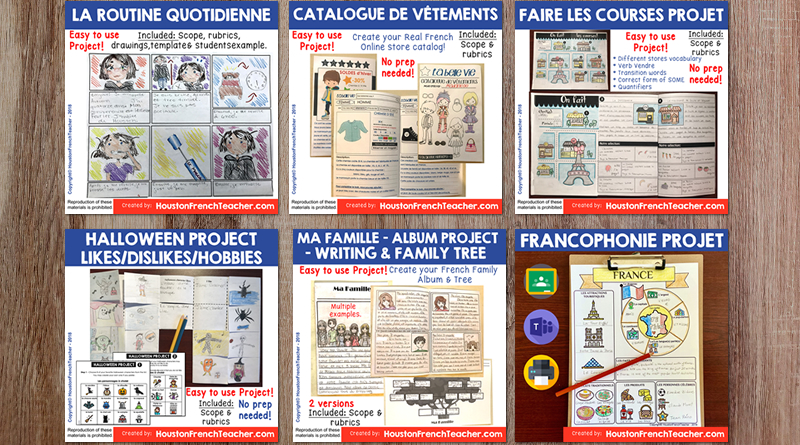French Project Based Learning
Unlocking French Fluency: Advantages of Integrating Projects into Language Learning
Ever wished learning French could be more than just memorizing vocabulary and grammar rules? Discover how PBL not only teaches French but also makes the language an exciting and practical adventure, opening doors to authentic communication and a deeper understanding of the vibrant French culture.
For teachers eager to infuse creativity and engagement into their French classrooms, Project-Based Learning (PBL) is an absolute game-changer. Imagine students not just learning French, but actively using it in real-life situations. PBL invites educators to design projects that align with language objectives while incorporating cultural nuances. For instance, a project on French-speaking countries could involve research, presentations, and even virtual tours, fostering language skills in a broader context. Embracing PBL in the French classroom means giving students ownership of their learning journey, encouraging collaboration, and instilling a genuine passion for the language and culture. Start small, perhaps with a project on daily routines or favorite hobbies, and watch as your students not only master French but also develop a profound connection with the language. With PBL, teaching French becomes an adventure for both educators and students alike. Here are the advantages of incorporating PBL.
1. Real-world Application of Language Skills:
Engaging in projects allows students to apply their French language skills in practical, real-world scenarios. From creating presentations to participating in discussions, projects foster authentic language use, bridging the gap between theory and application.
2. Cultivating Intrinsic Motivation:
Projects tailored to students’ interests kindle intrinsic motivation. When learners choose topics they are passionate about, the drive to explore, communicate, and express themselves in French becomes a personal journey, enhancing overall engagement and commitment.
3. Holistic Language Development:
Unlike traditional language learning methods that may focus solely on grammar and vocabulary, projects encourage a holistic approach. Students develop not only linguistic abilities but also cultural understanding, critical thinking, and effective communication skills.
4. Enhancing Collaboration and Communication:
Collaborative project work encourages students to communicate and cooperate with peers. Whether discussing ideas, sharing responsibilities, or presenting findings, students refine their interpersonal skills in a context that mirrors real-life language use.
5. Individualized Learning Paths:
Projects offer flexibility, allowing students to choose the depth and direction of their exploration. This individualized approach caters to diverse learning styles and preferences, empowering students to take ownership of their language learning journey.
6. Cognitive Skill Development:
Beyond language acquisition, projects stimulate cognitive skills such as problem-solving, analysis, and creativity. Students engage in higher-order thinking processes as they tackle challenges, fostering intellectual growth alongside language development.
7. Long-lasting Retention:
The immersive and experiential nature of projects contributes to long-lasting retention of language skills. Students remember vocabulary, grammar structures, and cultural insights more effectively when learned in the context of a meaningful project.
8. Cultural Appreciation:
Projects centered around French culture, traditions, and contemporary issues deepen students’ appreciation for the language. Through exploration and presentation of cultural elements, learners gain insights that go beyond linguistic competence, fostering a richer understanding of the Francophone world.
9. Building Confidence and Pride:
Successfully completing a project instills a sense of accomplishment. As students overcome linguistic and cultural challenges, their confidence in using French grows. This sense of achievement contributes to a positive attitude towards language learning.
10. Preparation for Real-life Language Use:
Projects mirror real-life language situations, preparing students for communication outside the classroom. Whether it’s discussing personal interests, presenting information, or collaborating with others, the skills acquired through projects are directly transferable to real-world language use scenarios.
Incorporating projects into French language learning not only accelerates linguistic proficiency but also nurtures a holistic, well-rounded skill set that empowers students in their language journey and beyond. Bon voyage on your path to French fluency!
Resources for French Project Based Learning
If you have any question or need support, you can always reach out to me at: HoustonFrenchTeacher@gmail.com, I would love to assist you!
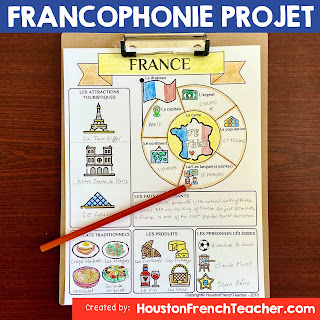 |
If you are looking a French Project on La Francophonie, French Speaking countries (for print and digital), this resource is compatible for any learning management system. The final results of these French project from your students can be used as nice visuals for your classroom. Every year, I love to hang those French infographics around my class! The completion of this project is beautiful! >>Link |
 |
Faire les courses – French Grocery Shopping French Food La Nourriture PROJET Students will practice their vocabulary on Grocery shopping by creating this fun project where students are in Paris for vacation and they are to visit all the different specialty stores! Their job is to write about the different products they find in each specialty store using the correct some, quantifiers etc… >>Link |
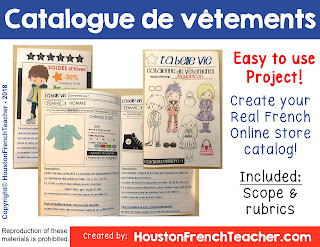 |
French clothing unit catalog project - Catalogue de vêtements Online Store This is a very fun project for students where they are the fashion designer getting ready to put out a catalog with their latest clothing line. Their job is to create a catalog for their online store with a detailed description of each item. It's a ready for use project. Teachers can just print the project requirement page, rubrics and the templates for their online store. The final product is a booklet catalog Students can draw their own illustrations, use cut-outs from magazine or use the included clip-arts. >>Link |
 |
This is a very fun project for students where they create a family album of their 4 favorite family members and make a family tree. Students will write a general presentation of their family on the cover page and describe fully 4 family members inside the photo album booklet. It’s a ready for use project. Teachers can just print the project requirement page, rubrics and the photo album templates or use powerpoint as a choice. Students can draw their family or use real photos. Students can present their family tree to the class. >>Link |
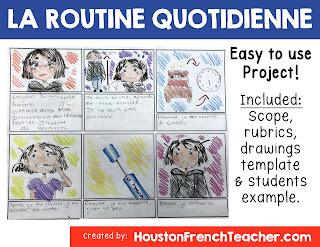 |
This is a ready for use project. Teachers can just print the project requirement page, rubrics and the 21 slides templates where students can draw their daily routines and write the corresponding French sentences. This project can be used in a multiple ways/options, students can just follow the scope and use their imagination to create the project. Students examples and videos are included for demonstration. Students will first introduce, describe themselves then talk about their daily routines (morning, daytime, after school, night and week-end). Students will have to use reflexive verbs and also incorporate transition words. Teachers can use this project for either present or passé compose tense. >>Link |
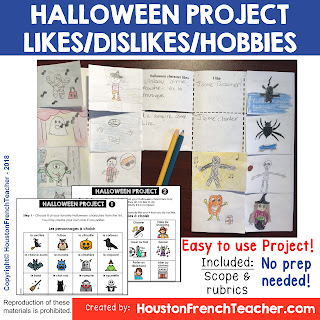 |
If you are looking for something fun and productive during Halloween, this will be a perfect mini project for the class. Students will be creating a foldable by pretending to detail what their favorite Halloween characters likes or dislikes. Students will draw 8 characters with the activities and will need to write 16 sentences. In this project, students will: * learn the French Halloween vocabulary * practice the activities/hobbies in French * practice “Aimer” and negative form of “Aimer” (n’aime pas) >>Link |

